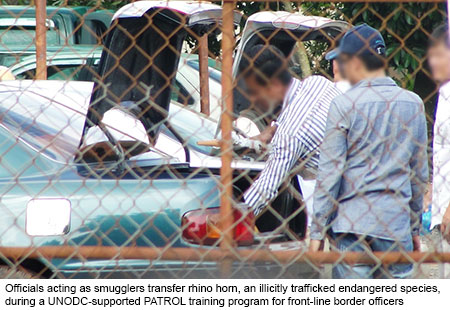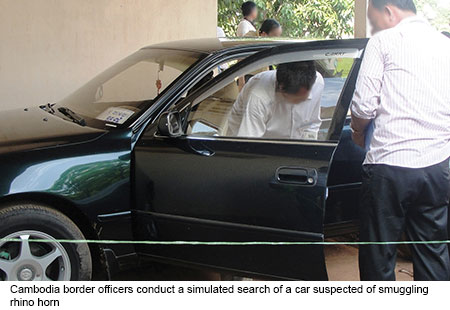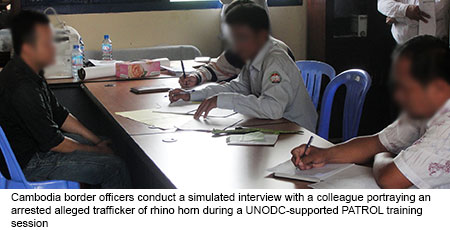
Kampong Cham Province (Cambodia), 10 October 2012 - It's 2pm and burning hot in a remote town on the border between Cambodia and Viet Nam. In a small restaurant, a police officer on surveillance in plain-clothes slowly sips ice tea, smokes cigarettes and waits. An old fan barely stirs the sticky air.
A few blocks away, the operation head radios his arrest team. The suspected traffickers have already crossed the border, he tells them. When the traffickers' cars stop at the meeting point, the surveillance officer tosses his cigarette and surveys the traffickers' rendezvous. A suspected wildlife trader removes a large rhino horn from the trunk of one car and deposits it into the second. The whole transaction is recorded on camera by the surveillance officer hidden in a building close by.
Once the illicit transfer is complete, an informant among the traffickers removes his hat - a signal. In a matter of seconds, it's all over: The arrest team blocks the two cars, and swiftly places the two suspected traffickers under arrest.
This is not a movie scene.

It is part of the latest anti-smuggling training course organized by the
PATROL (Partnership Against Transnational-crime through Regional Organized Law-enforcement) project. The two five-day PATROL seminars in Cambodia taught anti-smuggling techniques and provided specialized support to investigate migrant smuggling and environmental crimes to 45 Cambodian border law enforcement officers.
The objective of the course was to train border officers to help them better tackle all trans-boundary criminal activities. To do so, UNODC selected a unique set of trainers, comprising national experts from Immigration, Police, Customs, and Forestry Administration and international speakers from the
Australian Federal Police, the
Australian Department of Environment and Conservation,
Freeland Foundation,
UNEP and UNODC.
"This is the first time that I take part in a training course like this," said one participant. "I learned many new things during the classes, and really enjoyed the crime simulation that we used to plan and execute the arrest of the two suspected traffickers of wildlife and people."

Jointly organized by the National Authority to Combat Drugs and
UNODC Regional Centre for East Asia and the Pacific, this training activity was aimed at 45 Border Liaison Officers through the support of the
Department of Immigration and Citizenship in Australia and the Secretariat of the Convention on International Trade in Endangered Species of Wild Flora and Fauna
(CITES). In-kind support and active contribution to the seminar was given by the Freeland Foundation and UNEP. In addition UNEP donated to one of the Border Liaison Offices a device to identify refrigerants. For more information click
here.
Similar activities will be organized over the next months in Viet Nam and Thailand.
Background:
Established in 2010, PATROL is a joint initiative of the
United Nations Office on Drugs and Crime (UNODC) Regional Centre for East Asia and the Pacific, the United Nations Environment Programme
(UNEP),
FREELAND Foundation and
TRAFFIC in partnership with the governments of the Greater Mekong Sub-region.
PATROL seeks to improve border security at land borders, sea ports and airports in the Greater Mekong Sub-region (Thailand, Myanmar, Lao PDR, Cambodia, China and Viet Nam).
PATROL objectives include: establishing border liaison offices (BLOs) in Cambodia, Lao PDR, Thailand and Viet Nam and training BLO staff, port control and airport specialist response units to fight cross-border crimes related to illegal migration, particularly the trafficking in human beings, wildlife, drugs and materials dangerous to the environment.
|
|
PATROL is made possible through the kind
support of Australia and the United States of America |
|